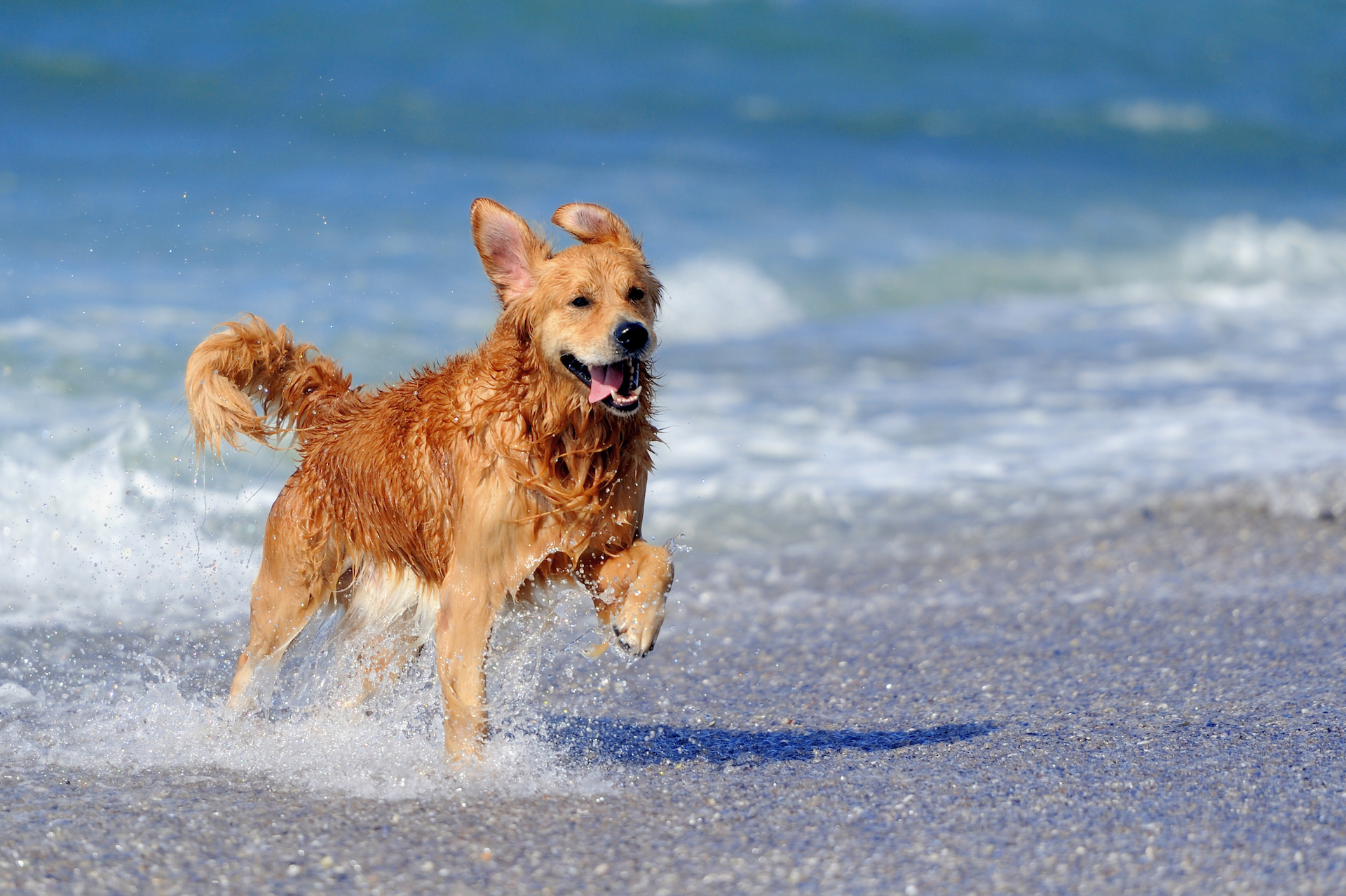Golden Retrievers (especially puppies) have a lot of energy. You might be wondering if the day will ever come that they chill out and stop zooming around the house from dawn to dusk.
Some Golden Retrievers will calm down when they’re between 2 to 4 years old. But there’s no specific age that you can expect your Golden Retriever to settle down – it’s unique for every dog. Some will be as bouncy and playful (just like a puppy) for their whole lives.
And even though your Golden Retriever might calm down from their energetic puppy stage, they’ll still need to get plenty of exercise and mental stimulation to keep them happy and healthy.
However, there are some things you can do to help calm your Golden Retriever and reasons that can affect if they’ll calm down. Read on to learn more!
Golden Retriever Energy Levels
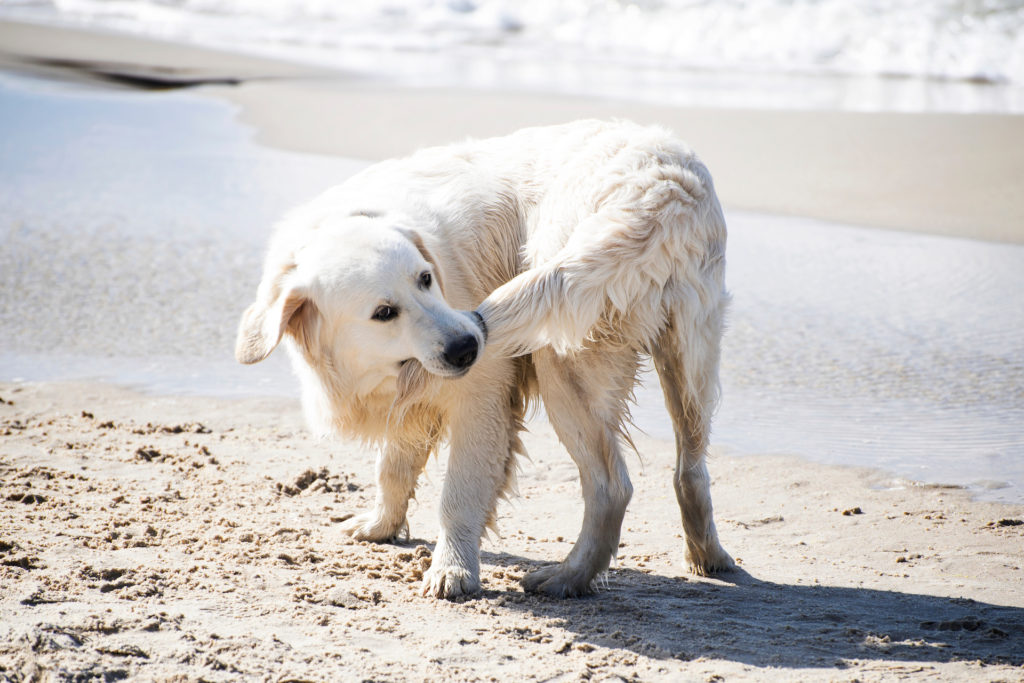
Golden Retrievers were bred to be working dogs. Though most Goldens are family pets these days, they still have an instinct to work. As such, they have a lot of pent-up energy that needs releasing!
You’ll see their energy a lot – when someone knocks on the door, when they have the zoomies, or when they’re making a mess like digging or chewing.
You can read more about where Golden Retrievers came from and what makes them such a successful working breed here.
10 Tips for Calming Your Golden Retriever Down
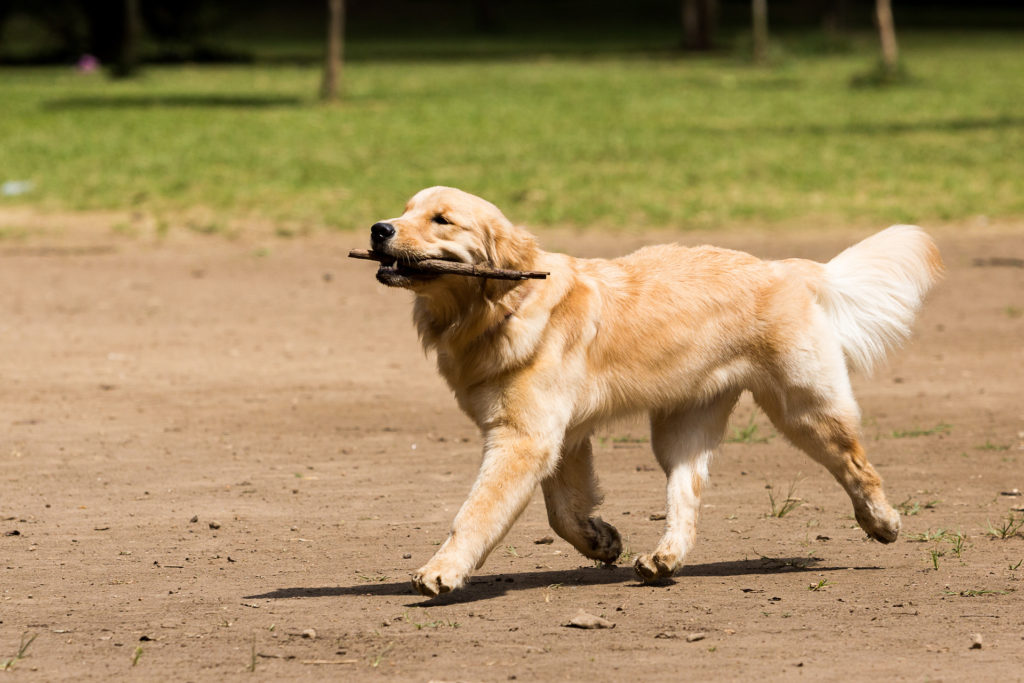
If you have a high-energy Golden Retriever, you might be at your wit’s end on what to do. Luckily, there are a bunch of things you can try to calm them physically and mentally.
The key here is to keep them busy:
- Increase exercise: As a breed designed to run for miles to fetch game and carefully bring it back to their owners, Golden Retrievers are born with the need to work and keep active. Goldens need a minimum of around 2 hours of exercise per day, and by maintaining this you ensure that they get the chance to burn some of that energy. This can be walking, running, swimming, fetching, and or playing games with you.
- Create and maintain a routine: This is a great way to curb unwanted behaviour. Dogs love structure, so repeating and following a routine will help your Goldie stay disciplined. They’ll learn what’s expected from them and recognise you as the boss. For example, a walk at 7 am and at 6 pm every day, and food at the same time.
- Mental stimulation: Providing new and challenging toys such as puzzle toys or Kongs will get their brain going and keep them occupied for longer periods. By teaching them tricks and commands, you also get to exercise their brain and keep them occupied.
- More socialisation: As social animals, dogs benefit from being around other dogs. They can play to their heart’s content. They also learn motor skills and how to act by copying other dogs. Try setting up a doggy play date or see if there are any arranged Golden Retriever meet-ups where you live.
- Positively reinforce good behaviour: Praise, treats, and positive words will all teach your Golden Retriever that it’s good to be calm and cool. They’ll want to please you so they’ll quickly learn what you want them to do.
- Ignore bad behaviour: If your Golden is hyper and up to no good, ignoring them and walking away (though not leaving them unsupervised) will teach them that you’re not interested in silly business.
- Redirect their energy: Giving your Golden Retriever a task (like carrying a toy or stick) will focus their mind as they concentrate. This is especially useful while walking them.
- Check with a vet: There’s a possibility that they have an underlying health issue. This could explain if they’re restless or unable to settle. And if nothing is found, it gives you peace of mind.
- See a dog training professional: If you’re struggling to get control of your Goldie and calm them down, you could find a local trainer that has experience with especially head-strong and energetic dogs.
- Assess the environment: Have a good look and listen around you. Is there an unusual sound or smell, or an unfamiliar person nearby who could be stressing your Golden out?
Even when your dog is being disobedient and making you angry, you shouldn’t physically punish them. This will only impose fear and make things worse.
Remember that every Golden Retriever is different, and what works for one Goldie might not work for another. It’ll be trial and error until you figure it out, and you could always get professional help if you’re struggling.
A Side Note on Toys for Golden Retrievers
When you’re getting toys to keep your Golden Retriever occupied, there are a few things you should consider:
- How durable is the toy? Although tougher toys usually cost more, it’s often worth the investment. The chance of ingesting a foreign object is reduced and it’ll last a lot longer too.
- Do you have any puzzle toys? This can be anything from a Kong stuffed with meat paste, to a smarter contraption with levers and buttons that your Goldie has to figure out to reveal treats. These are the toys that’ll keep them busy for a while.
- Is there variety? Golden Retrievers can get bored of the same toys all the time. Rotating them is like giving them new toys to play with – there’ll be a lot of excitement!
Getting toys is a great step in keeping your Golden Retriever entertained. It can provide mental stimulation and distract them if they’re home alone.
Why Would an Energetic Golden Retriever Be a Problem?
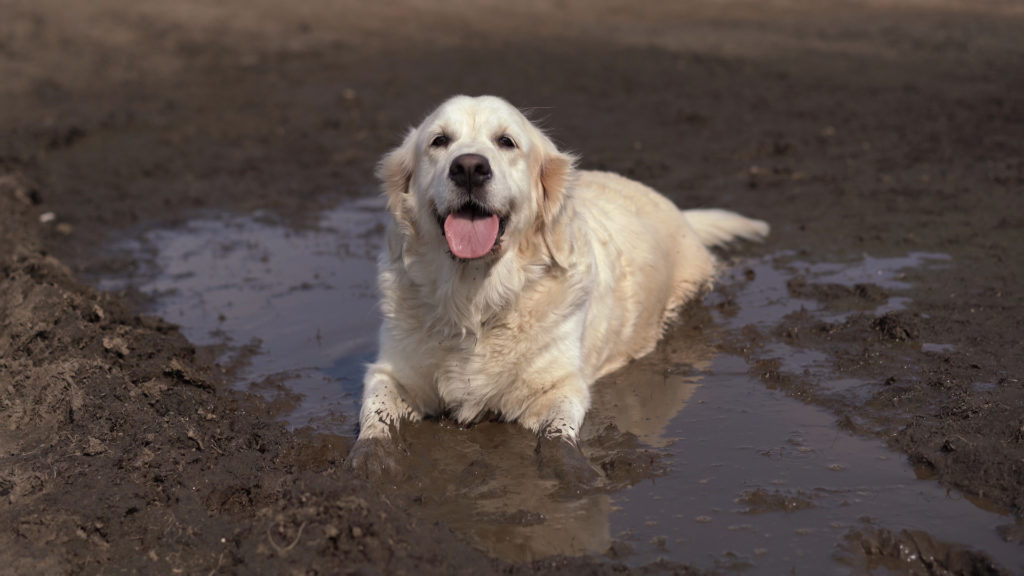
Everyone is different – what might be too much energy to cope with for one person might not be a problem for another.
But a Golden Retriever might develop several problems if they can’t burn off their energy. This can be further worsened if they’re left alone for long periods. Before getting a Golden Retriever, consider if you have enough time to match their energy and needs.
A high energy Golden Retriever might:
- Become more aggressive: A combination of too much energy and boredom can lead to aggressive behaviour from your Golden Retriever. This can be in the form of biting, barking, and more.
- Become hyperactive: A Golden Retriever with unchanneled energy can become frustrated and start acting out. This is a clear sign that they need to be physically and mentally challenged more.
- Suffer from separation anxiety: If your Goldie is home alone and restless with energy they can’t use, they’ll be desperate for your return. It can become a long-term issue where they become dependent on you and get extremely worked up and upset when you try to leave.
- Become depressed: If you notice your Golden is withdrawn, that their sleeping habits have changed, or if they’ve lost their appetite (to name just a few signs) then your dog could be depressed.
- Become bored: A bored dog can quickly turn into a naughty dog. Behaviours like digging and chewing are prime examples of things your Golden might do if they’re wound up and need to release some energy.
The good news is that if you’re having problems due to your Goldie’s high energy, you can check out the top 10 tips above to help calm them down.
Are Golden Retrievers the Most Energetic Breed?
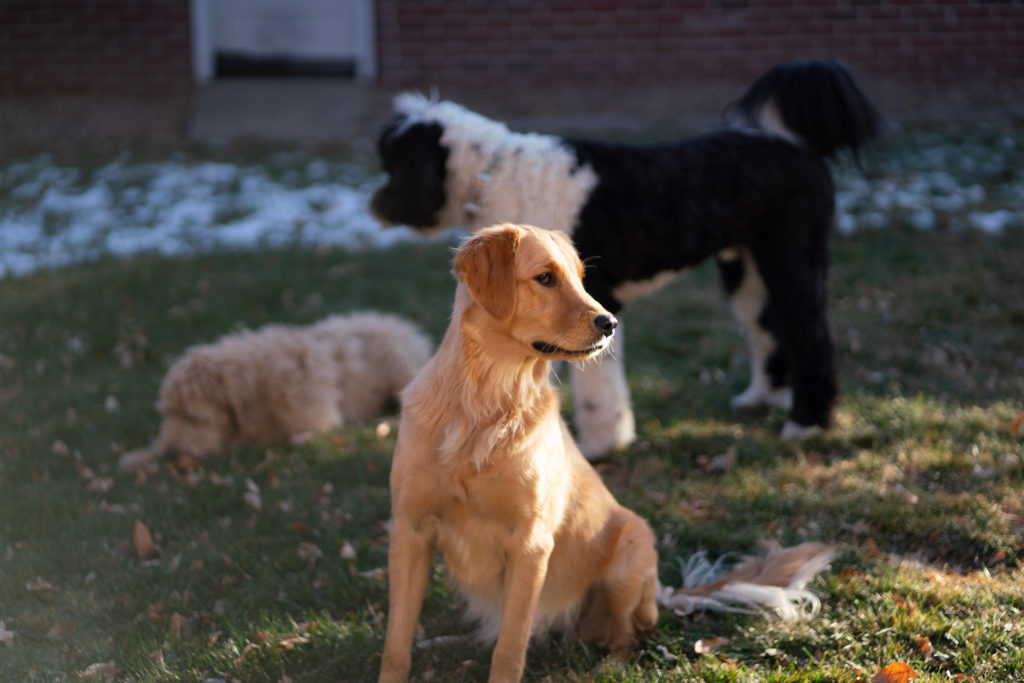
According to the American Kennel Club, Golden Retrievers rank in the top 15 most active breeds. Although there are a few breeds that may surpass them for having the most energy, Goldies are comfortably near the top of the list.
Alongside them on the most active breed list are (not in any particular order):
- Border Collies
- German Shepherds
- Poodles
- Irish Setters
- English Springer Spaniel
- Beagle
- Siberian Husky
- Dalmatian
- Shetland Sheepdog
- Pembroke Welsh Corgi
- Labrador Retriever
- Russell Terrier
- Australian Shepherd
- Miniature Pinscher
If you’re looking for a dog who’ll need low levels of exercise and be happy having a snooze with you, then you should avoid these breeds! Or perhaps aim to get a more elderly dog who’ll have slowed down a bit.
Related Questions
When Do Golden Retrievers Stop Chewing Everything?
All puppies love to chew and nip. This is a natural behaviour that is curbed by their mother and littermates. Once they go home with you, it’s your job to teach them not to bite. By around five months (with proper training) your Golden should have stopped biting or nipping.
Chewing on the other hand, is them exploring the world. Chewing, on average, lasts from around three months to one year old. After age one, chewing might be more of a behavioural issue than chewing to help their teeth.
Which Is Calmer: A Golden Retriever or Labrador Retriever?
Out of Golden Retrievers and Labrador Retrievers, neither one can be declared the calmer breed. They’re equally as active and high-energy as each other, and both have a history as working dogs.
